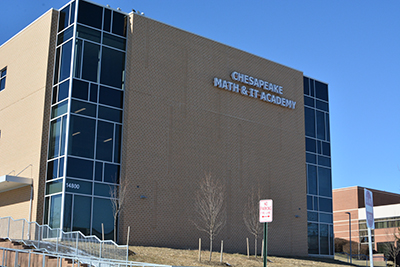Contributing to the wider community is an important endeavor for any college or university.
For Capitol Technology University, this includes helping to foster engineering and technology education among students in the community. One way the university is accomplishing this goal is through a partnership with the Chesapeake Math and IT Academy (CMIT), a STEM-focused charter school that prides itself on educating students to become tech-savvy citizens.

Starting in 2016, Capitol faculty and students have been helping out with four clubs at CMIT: climate, cybersecurity, gaming, and robotics.
“We feel it’s important to help build the STEM education pipeline not only in Maryland and the region, but here in our immediate community,” said Dr. Nayef Abu-Ageel, dean of academics at Capitol. “As a tech-focused charter school, CMIT’s vision is closely aligned with what we do at Capitol. It’s a great opportunity for a partnership.”
As part of the collaboration, Capitol students have visited CMIT to help prepare students in the school’s cybersecurity club for competitions – an arena in which Capitol has longstanding experience. “Capitol’s Cyber Battle Team is a seasoned competitor at the Mid-Atlantic Cyber Defense Competition (MACCDC) and many other events,” notes Dr. William Butler, chair of the cyber program at Capitol. “Two of our students, Jonathan Taylor and John Greim, have been meeting with CMIT students every Friday in order to share their knowledge and skills.”
CMIT students have also attended Capitol’s Cyber Saturdays – a regular offering at the university that includes game-based challenges designed to build cybersecurity skills. “Plans for 2018 are to expand our activities with the clubs to include more focused sessions in wireless, forensics, malware analysis, and secure communications,” Butler says.
The robotics club at CMIT, meanwhile, has been working with Capitol engineering professor Dr. Chandra Bajracharya as it prepares for Vex Robotics competitions.
“Vex Robotics provides a curriculum-based robotics program designed to expose students to STEM activities and engineering design process from the very beginning,” Bajracharya says. "The robotics club at Capitol has students with experience in Vex Robotics who will be working with the CMIT students."
“The collaboration between CMIT and Capitol not only enables our students to gain experience and exposure by acting as mentors to high school students but also motivates our students to be actively involved in their own club. We consider it an important outreach activity that builds a relationship in our community” she said.
For Capitol Technology University, this includes helping to foster engineering and technology education among students in the community. One way the university is accomplishing this goal is through a partnership with the Chesapeake Math and IT Academy (CMIT), a STEM-focused charter school that prides itself on educating students to become tech-savvy citizens.

Starting in 2016, Capitol faculty and students have been helping out with four clubs at CMIT: climate, cybersecurity, gaming, and robotics.
“We feel it’s important to help build the STEM education pipeline not only in Maryland and the region, but here in our immediate community,” said Dr. Nayef Abu-Ageel, dean of academics at Capitol. “As a tech-focused charter school, CMIT’s vision is closely aligned with what we do at Capitol. It’s a great opportunity for a partnership.”
As part of the collaboration, Capitol students have visited CMIT to help prepare students in the school’s cybersecurity club for competitions – an arena in which Capitol has longstanding experience. “Capitol’s Cyber Battle Team is a seasoned competitor at the Mid-Atlantic Cyber Defense Competition (MACCDC) and many other events,” notes Dr. William Butler, chair of the cyber program at Capitol. “Two of our students, Jonathan Taylor and John Greim, have been meeting with CMIT students every Friday in order to share their knowledge and skills.”
CMIT students have also attended Capitol’s Cyber Saturdays – a regular offering at the university that includes game-based challenges designed to build cybersecurity skills. “Plans for 2018 are to expand our activities with the clubs to include more focused sessions in wireless, forensics, malware analysis, and secure communications,” Butler says.
The robotics club at CMIT, meanwhile, has been working with Capitol engineering professor Dr. Chandra Bajracharya as it prepares for Vex Robotics competitions.
“Vex Robotics provides a curriculum-based robotics program designed to expose students to STEM activities and engineering design process from the very beginning,” Bajracharya says. "The robotics club at Capitol has students with experience in Vex Robotics who will be working with the CMIT students."
“The collaboration between CMIT and Capitol not only enables our students to gain experience and exposure by acting as mentors to high school students but also motivates our students to be actively involved in their own club. We consider it an important outreach activity that builds a relationship in our community” she said.
No comments:
Post a Comment